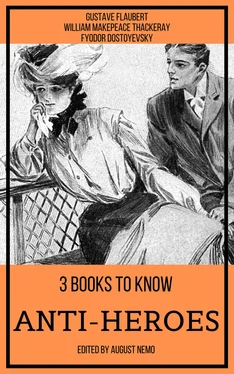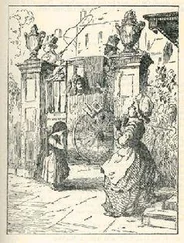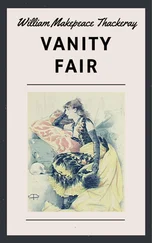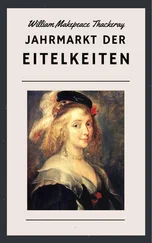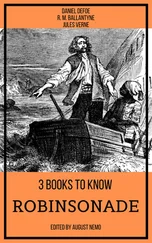And I was grateful to my employers; more grateful than they to me. The Captain was in debt, and had dealings with the Jews, to whom he gave notes of hand payable on his uncle’s death. The old Herr von Potzdorff, seeing the confidence his nephew had in me, offered to bribe me to know what the young man’s affairs really were. But what did I do? I informed Monsieur George von Potzdorff of the fact; and we made out, in concert, a list of little debts, so moderate, that they actually appeased the old uncle instead of irritating, and he paid them, being glad to get off so cheap.
And a pretty return I got for this fidelity. One morning, the old gentleman being closeted with his nephew (he used to come to get any news stirring as to what the young officers of the regiment were doing: whether this or that gambled; who intrigued, and with whom; who was at the ridotto on such a night; who was in debt, and what not; for the King liked to know the business of every officer in his army), I was sent with a letter to the Marquis d’Argens (that afterwards married Mademoiselle Cochois the actress), and, meeting the Marquis at a few paces off in the street, gave my message, and returned to the Captain’s lodging. He and his worthy uncle were making my unworthy self the subject of conversation.
‘He is noble,’ said the Captain.
‘Bah!’ replied the uncle (whom I could have throttled for his insolence). ‘All the beggarly Irish who ever enlisted tell the same story.’
‘He was kidnapped by Galgenstein,’ resumed the other.
‘A kidnapped deserter,’ said M. Potzdorff; ‘la belle affaire!’
‘Well, I promised the lad I would ask for his discharge; and I am sure you can make him useful.’
‘You HAVE asked his discharge,’ answered the elder, laughing. ‘Bon Dieu! You are a model of probity! You’ll never succeed to my place, George, if you are no wiser than you are just now. Make the fellow as useful to you as you please. He has a good manner and a frank countenance. He can lie with an assurance that I never saw surpassed, and fight, you say, on a pinch. The scoundrel does not want for good qualities; but he is vain, a spendthrift, and a bavard. As long as you have the regiment in terrorem over him, you can do as you like with him. Once let him loose, and the lad is likely to give you the slip. Keep on promising him; promise to make him a general, if you like. What the deuce do I care? There are spies enough to be had in this town without him.’
It was thus that the services I rendered to M. Potzdorff were qualified by that ungrateful old gentleman; and I stole away from the room extremely troubled in spirit, to think that another of my fond dreams was thus dispelled; and that my hopes of getting out of the army, by being useful to the Captain, were entirely vain. For some time my despair was such, that I thought of marrying the widow; but the marriages of privates are never allowed without the direct permission of the King; and it was a matter of very great doubt whether His Majesty would allow a young fellow of twenty-two, the handsomest man of his army, to be coupled to a pimplefaced old widow of sixty, who was quite beyond the age when her marriage would be likely to multiply the subjects of His Majesty. This hope of liberty was therefore vain; nor could I hope to purchase my discharge, unless any charitable soul would lend me a large sum of money; for, though I made a good deal, as I have said, yet I have always had through life an incorrigible knack of spending, and (such is my generosity of disposition) have been in debt ever since I was born.
My captain, the sly rascal! gave me a very different version of his conversation with his uncle to that which I knew to be the true one; and said smilingly to me, ‘Redmond, I have spoken to the Minister regarding thy services,[Footnote: The service about which Mr. Barry here speaks has, and we suspect purposely, been described by him in very dubious terms. It is most probable that he was employed to wait at the table of strangers in Berlin, and to bring to the Police Minister any news concerning them which might at all interest the Government. The great Frederick never received a guest without taking these hospitable precautions; and as for the duels which Mr. Barry fights, may we be allowed to hint a doubt as to a great number of these combats. It will be observed, in one or two other parts of his Memoirs, that whenever he is at an awkward pass, or does what the world does not usually consider respectable, a duel, in which he is victorious, is sure to ensue; from which he argues that he is a man of undoubted honour.] and thy fortune is made. We shall get thee out of the army, appoint thee to the police bureau, and procure for thee an inspectorship of customs; and, in fine, allow thee to move in a better sphere than that in which Fortune has hitherto placed thee.
Although I did not believe a word of this speech, I affected to be very much moved by it, and of course swore eternal gratitude to the Captain for his kindness to the poor Irish castaway.
‘Your service at the Dutch Minister’s has pleased me very well. There is another occasion on which you may make yourself useful to us; and if you succeed, depend on it your reward will be secure.’
‘What is the service, sir?’ said I; ‘I will do anything for so kind a master.’
‘There is lately come to Berlin,’ said the Captain, ‘a gentleman in the service of the Empress-Queen, who calls himself the Chevalier de Balibari, and wears the red riband and star of the Pope’s order of the Spur. He speaks Italian or French indifferently; but we have some reason to fancy this Monsieur de Balibari is a native of your country of Ireland. Did you ever hear such a name as Balibari in Ireland?’
‘Balibari? Balyb—?’ A sudden thought flashed across me. ‘No, sir,’ said I, ‘I never heard the name.’
‘You must go into his service. Of course you will not know a word of English: and if the Chevalier asks as to the particularity of your accent, say you are a Hungarian. The servant who came with him will be turned away to-day, and the person to whom he has applied for a faithful fellow will recommend you. You are a Hungarian; you served in the Seven Years’ War. You left the army on account of weakness of the loins. You served Monsieur de Quellenberg two years; he is now with the army in Silesia, but there is your certificate signed by him. You afterwards lived with Doctor Mopsius, who will give you a character, if need be; and the landlord of the “Star” will, of course, certify that you are an honest fellow: but his certificate goes for nothing. As for the rest of your story, you can fashion that as you will, and make it as romantic or as ludicrous as your fancy dictates. Try, however, to win the Chevalier’s confidence by provoking his compassion. He gambles a great deal, and WINS. Do you know the cards well?’
‘Only a very little, as soldiers do.’
‘I had thought you more expert. You must find out if the Chevalier cheats; if he does, we have him. He sees the English and Austrian envoys continually, and the young men of either Ministry sup repeatedly at his house. Find out what they talk of; for how much each plays, especially if any of them play on parole: if you can read his private letters, of course you will; though about those which go to the post, you need not trouble yourself; we look at them there. But never see him write a note without finding out to whom it goes, and by what channel or messenger. He sleeps with the keys of his despatch-box on a string round his neck. Twenty Frederics, if you get an impression of the keys. You will, of course, go in plain clothes. You had best brush the powder out of your hair, and tie it with a riband simply; your moustache you must of course shave off.
With these instructions, and a very small gratuity, the Captain left me. When I again saw him, he was amused at the change in my appearance. I had, not without a pang (for they were as black as jet, and curled elegantly), shaved off my moustaches; had removed the odious grease and flour, which I always abominated, out of my hair; had mounted a demure French grey coat, black satin breeches, and a maroon plush waistcoat, and a hat without a cockade. I looked as meek and humble as any servant out of place could possibly appear; and I think not my own regiment, which was now at the review at Potsdam, would have known me. Thus accoutred, I went to the ‘Star Hotel,’ where this stranger was,—my heart beating with anxiety, and something telling me that this Chevalier de Balibari was no other than Barry, of Ballybarry, my father’s eldest brother, who had given up his estate in consequence of his obstinate adherence to the Romish superstition. Before I went in to present myself, I went to look in the remises at his carriage. Had he the Barry arms? Yes, there they were: argent, a bend gules, with four escallops of the field,—the ancient coat of my house. They were painted in a shield about as big as my hat, on a smart chariot handsomely gilded, surmounted with a coronet, and supported by eight or nine Cupids, cornucopias, and flower-baskets, according to the queer heraldic fashion of those days. It must be he! I felt quite feint as I went up the stairs. I was going to present myself before my uncle in the character of a servant!
Читать дальше
